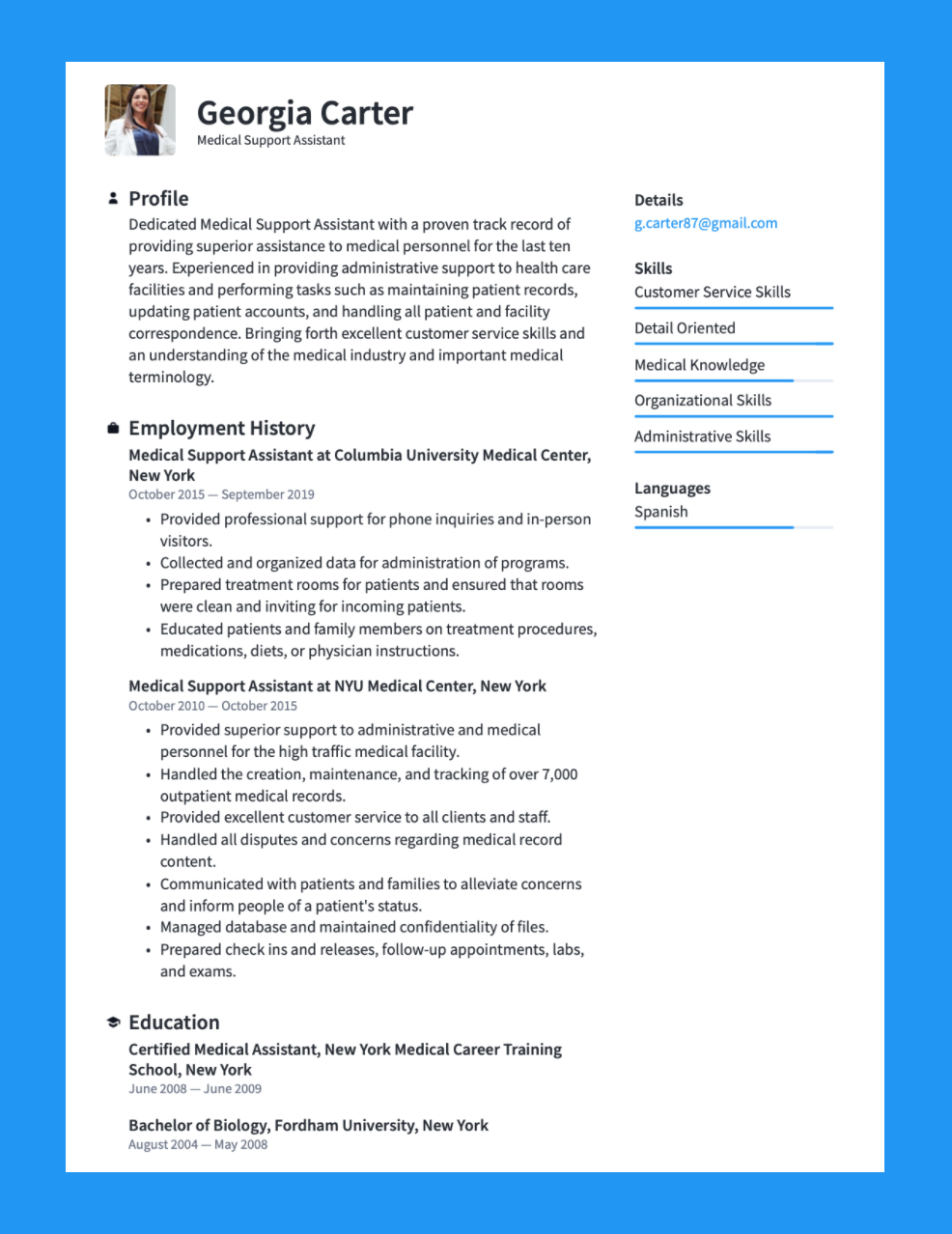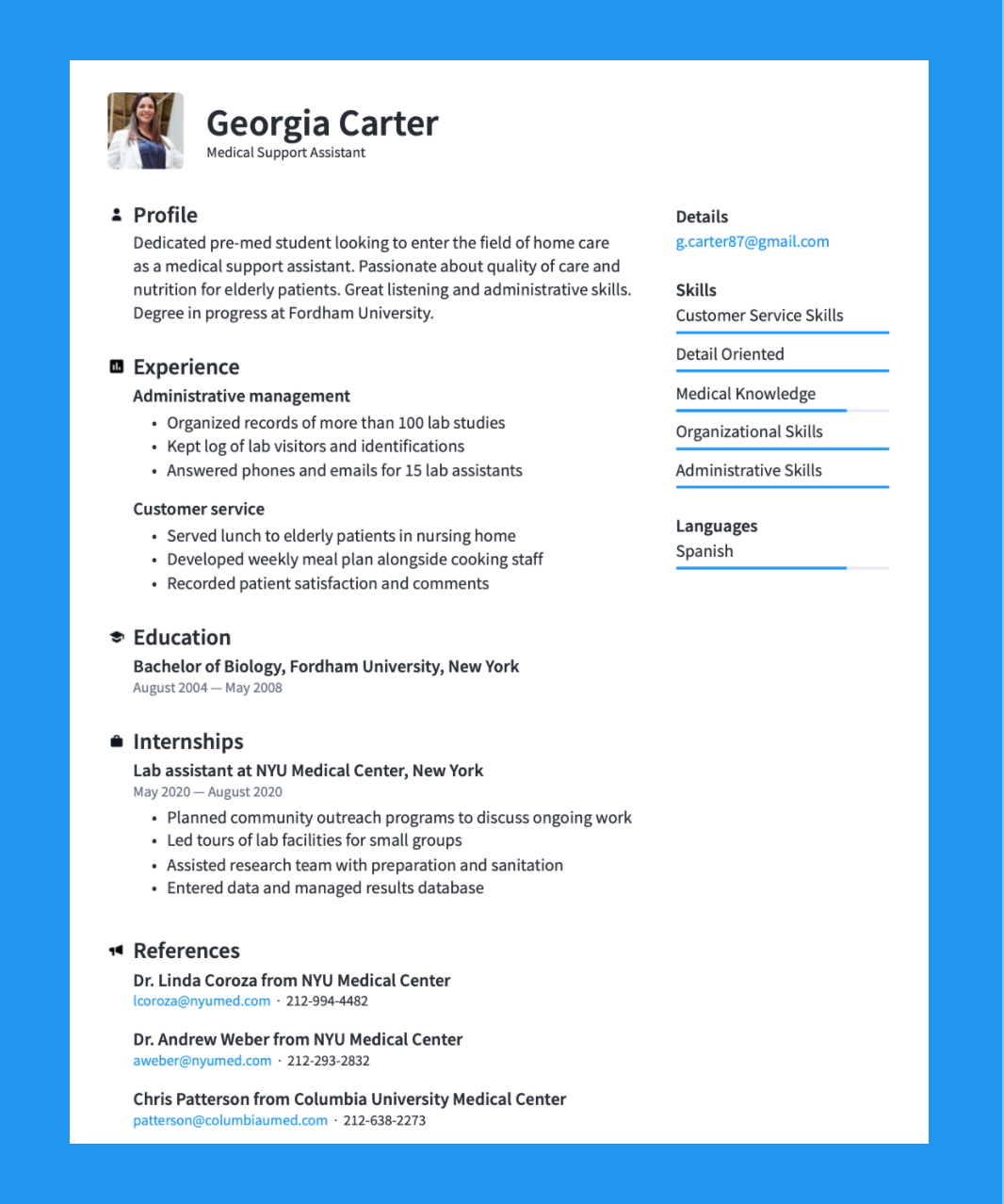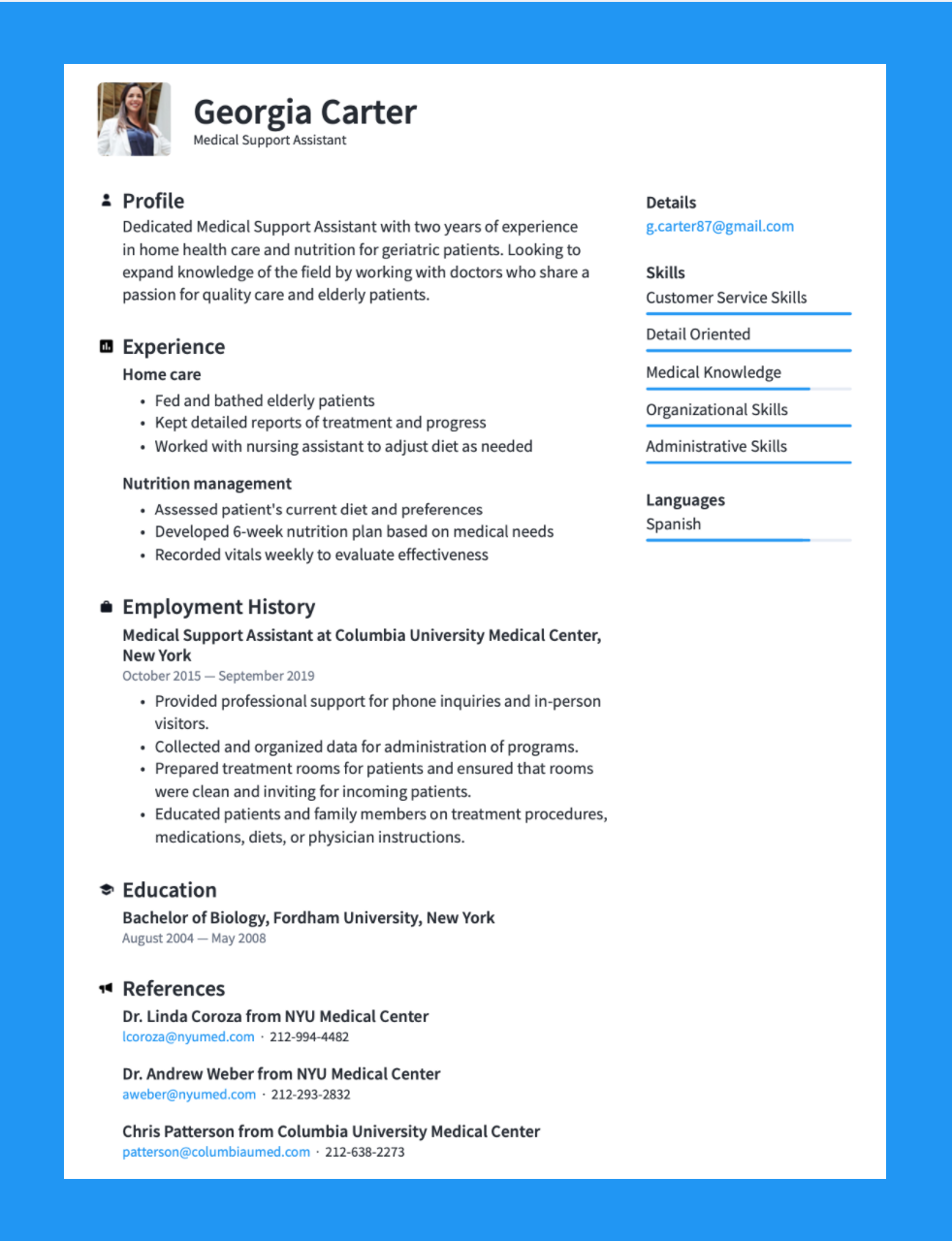What is a resume format?
The phrase “resume format” is often a confusing one, since different sources use this term to refer to different/multiple things. In the most basic sense, a resume format is the type of structure your resume has depending on the order in which resume sections are presented, how the employment history section is written and which sections are given the most emphasis. For example, in one type of resume format, the skills section may be overly emphasized, while in another, your work history will take center stage.
3 main types of resume formats
Luckily when it comes to choosing a resume format, your choices are already narrowed down to three main types:
- Reverse chronological
- Functional
- Combination
Each one offers unique advantages and none are one-size-fits-all. You may even want to create a version of your resume in each format depending on the job title, the company or even the country in which you are applying. An online resume builder can make it much easier to quickly switch around sections and go from one format to another without much fuss.
Reverse chronological format
The old standard, the reverse chronological format has probably been around nearly as long as resumes. And it’s not without good reason. A chronological format is still the best way to showcase employment history , especially in traditional industries where climbing the corporate ladder is the most commonly accepted route.
“Reverse” refers to the fact that this format begins with your most current (or most recent) place of employment and works backwards until you’ve listed all your relevant experiences of the past ten years. While you don’t need to include everything you’ve done in that timeframe (for example, you’ll want to leave off your server experience on an architect resume) you do want to pay attention to any gaps in employment history as the chronological format can quickly make them stand out to the hiring manager.
- Use a chronological format if your work experience is your key selling point.
- Pick a chronological format just because you think you have to even if it doesn’t match your experience.

Functional resume format
For jobs where specialized skills count for more than employment history, the functional resume can be a lifesaver. This format allows you to highlight your expertise right from the top of your resume in a section often called “Experience.” Whereas a chronological resume format shows an employer what you’ve accomplished in the past, a functional resume format is more focused on the skills and specialized knowledge you can offer right now.
Since a functional resume format is more flexible than a chronological one, it’s a great choice for a variety of job situations. Skilled tradespeople, freelancers, gig workers, students and even recent grads can all benefit from highlighting their strengths without having to categorically organize them under previous positions which may be too numerous or repetitive.
- Choose a functional format if your skills are the most important aspect of your job.
- Create a functional resume just because you lack work experience in a field that traditionally requires a chronological resume.

Combination resume format
A combined format, sometimes called a combination format, is exactly what it sounds like: the perfect fusion of the chronological and functional formats. The need for a combined resume format is often dictated by the candidate’s job search. For example, a freelancer looking to apply to a full time position may want to begin the resume with top skills before following up with an Employment History section to show their ability to work in environments similar to the prospective employer’s.
The advantage of the combined resume is that it allows the job seeker to first draw the hiring manager’s attention to their strengths, while also providing the employment history information that many traditional companies still expect. For candidates whose experience best fits a functional resume but aren’t sure how well it will be received, a combined resume is the right choice.
Here's a video that can help you choose between a combination or chronological resume format.
- Create a combined resume if you want to take an innovative approach, highlight key abilities or you are making a career transition.
- Confuse a hiring manager by burying or hiding certain sections that you know they will expect.

Choosing the best resume format (top 5 tips)
Here are our top 5 tips for choosing a resume format and finishing it inside a resume builder:
- Choose a resume format that is aligned with the tone and branding of your prospective employer
- When in doubt, a simpler, more traditional template is a safer choice than a more eccentric one
- Your template should contain a healthy balance of white space to text so as not to overwhelm the reader with information
- Decide which resume sections are most important for your experience and choose a resume format that is designed to focus on those
- Don’t be afraid to move around the sections or try out a different format to see which version of your resume works best.
Check out this video for more tips on deciding which format is right for you.
If you spent at least some portion of your career believing that there was only one correct way to format a resume, we’d understand. Most people are familiar with the reverse chronological resume format which dictates that you begin your resume with your most recent position and work backwards from there. Although chronological may still be the most common format, that doesn’t mean it’s right for everyone. Many candidates find that selecting a different resume format better allows them to highlight their diverse experiences and unique skills.
Likewise, many forward-thinking hiring managers are no longer looking for cookie-cutter employees. They want applicants to showcase an entrepreneurial spirit and a willingness to adapt to the workplace of the future. While the chronological format may still work best for communicating previous positions, adding elements of a functional format to create a combined one can quickly set apart an innovative candidate.
In the chapters below, we’ll cover everything you need to know about selecting the perfect resume formats including:
- The three main types of resume formats and the differences between them
- Which format to pick in 2021 based on current trends in hiring
- Top tips for choosing a resume templates to help you get started
Many hiring managers can spend less than 30 seconds reviewing a resume. Clean formatting without spelling or grammatical errors is one of the first things they take in, according to Mashable.
Which resume format 2021
Ultimately, no resume format is more correct than another. It all comes down to your experience, industry and potential employer. When choosing a resume format for 2021, there are a few questions you can ask yourself to determine which resume format is right for you.
If you answer YES to any of the following questions, you may want to consider switching from a chronological format to a functional or combined one:
- Do I have a rare skill set I want the employer to notice right away?
- Am I switching to a different career or job function where I have no previous work experience?
- Have I learned a variety of important skills in only one or two positions?
- Will my prospective employer appreciate a fresh and direct approach to resume formatting?
While combined resumes will be on the rise in the coming years, that doesn’t mean a nontraditional format is for everyone. Here are some situations in which a chronological format is likely the best choice:
- Your knowledge from previous workplaces is more important that standalone skills
- You are applying to a large company which has a traditional structure
- Your competition likely have traditional career paths with impressive employers
- You have a sizeable amount of work history directly related to your prospective position
- You’ve worked at other companies comparable to your prospective employer
We also have made a chart to see which resume format is the best for you:
| Resume format | Chronological | Functional | Hybrid |
| Properties | Focused on employment history | An option for career starters | A combination of the functional and chronological formats |
| Great for traditional corporate careers | Best for those with minimal work experience | Generally starts with an experience section followed by a shorter work history | |
| Most expected by hiring managers | Focused on skills and personality traits | A great choice for people in creative fields or freelancers |
How 2021 job trends influence resume formatting choices
It’s no surprise that in 2021 the way we work is changing – big time. And that affects everything from the methods of conducting your job search to formatting your resume. With more companies favoring remote teams, flexible hours and specialized candidates, there is a lot to adapt to when it comes to finding a new position or even starting a career from scratch.
In this chapter, we’ll discuss some of the major trends for work in 2021 and how you can adjust your resume formatting choices to increase your chances of landing your dream job. Here’s what’s ahead:
- Work from home: a blessing or a curse?
- Freelancers’ role in the market
- Specialized workers lead the way
- Breaking into the workforce in 2021
- How modern technology is shifting hiring practices
Formatting a resume for a remote position
For many, remote work may be an entirely new experience but that doesn’t mean it’s going anywhere anytime soon. Companies have seen the advantages of working from home in increased productivity, employee morale and a reduction in overhead costs. According to NPR, many of America’s largest companies are planning to free their employees from the walls of the office for the foreseeable future.
According to researchers at MIT, more than half of the American workforce is currently working remotely. Good luck finding a new chair for the home office!
Which resume format you choose for a remote position largely depends on the type of work you do. There are many industries where the fact that you’re working from home won’t mean you should jump ship on a chronological resume. However, if there are other factors in play, for example you are looking for part-time creative work while still holding another job, you may consider a combined resume format to paint a clearer picture of what you do. Just make sure to label remote positions as such so that a potential employer sees that you are comfortable in a digitally connected environment.
The best resume format for freelancers in 2021
After having long struggled in a work world designed for traditional employees, in 2021 freelancers are finally ahead of the game. According to CNBC, the freelance market is booming, with more than one-third of Americans turning to freelance work this year and employers looking to hire them, especially in the fields of ecommerce, web and mobile design.
So for freelancers looking to have their day in the sun, what’s the best resume format? It depends on your objectives. For freelancers looking to remain in their current situation, a functional resume might serve as a great way to show clients what they are capable of. A combined resume can be a great choice if your skills are your selling point but you also have some impressive previous employers that can’t be missed. Finally, if you are transitioning to full time work, a chronological resume may be the right choice.
How to highlight specialized knowledge on a resume format
According to McKinsey, specialization is the way of the future. Employees who can handle one task well are likely to fare better than generalists in the long run. Low-wage jobs will be replaced with employees who have superior knowledge of products and the market (think “super agents” instead of just call center workers.) Many people will need to learn new skills and focus on career development in order to have the best chances of future advancement.
So what do these changes mean for your resume formatting? For one, companies want to know what you can bring to the table. A combined resume format can help you highlight specialized knowledge without appearing like you don’t have much industry experience to show. If you complete any training or certifications this year, you may also want to format your resume to include an additional section to showcase them.
1 in 16 workers will need to change occupations by 2030, according to the McKinsey report. If a career switch is in the cards, your resume format may help give you a fighting chance against more established candidates. Consider a functional format if you have no experience in the new field and a combined format if you have 1-3 related positions to show.
The best resume format for recent grads 2021
Recent graduates are facing a tough moment to enter the job market as companies shrink the number of entry-level hires and interns they are willing to take on. However, it’s not all bad news. Although many companies have a temporary hiring freeze, they are expecting to reach pre-pandemic hiring levels by summer 2021, according to Forbes.
When it comes to the best resume format for recent grads in 2021, flexibility and skills are everything. That doesn’t mean you should jump straight to a functional resume format however. Hiring managers are wary of grads who try to cover a lack of work experience by focusing only on skills. If you have some previous internship experience, it can be enough to create a chronological resume format or a combined one if that’s a better choice for your industry.
Great news for recent grads – it’s becoming easier to find a job with less experience. According to Forbes, more than 70 percent of roles today have less requirements than one year ago.
Formatting your resume to pass the ATS
Did you know that two-thirds of the resumes submitted for a single position never make it to the hiring manager’s desk? That’s because a human HR rep is no longer the first gatekeeper when it comes to making new hires. A large percentage of today’s workplaces are employing ATS – Applicant Tracking Systems – to help filter out candidates, saving the hiring manager a lot of time and energy.
The ATS algorithms scan resumes for keywords and rank them against the other applicants. Only a top selection moves on to be read by a human hiring manager. You may have all the right experience and skills but if you don’t format them correctly, there’s a big chance you’ll miss out on the opportunity for an interview.
Expert tip
When it comes to formatting your resume to pass the ATS, here’s what we recommend:
- Choose a format that is well-organized and easy for the ATS to scan
- Label your sections with standard headings like “Employment History” or “ Education ” instead of more creative names which may confuse the ATS
- Make sure your resume is free of spelling errors since the ATS won’t understand even obvious typos
- Download your resume in a format that’s easy for the ATS to read, Docx or PDF are two of the most common
- Avoid graphic elements or pictures containing important text since the ATS will not be able to isolate it
Key takeaways plus top 5 resume format tips
We hope this guide to resume formats has prepared you to make the best choice for your own experience and career goals in the ever-changing landscape of 2021. Here are our top 5 resume format tips to remember:
- The reverse chronological resume format remains the most common one and the best pick for traditional companies where work experience is the most important factor
- Functional resumes allow you to focus on specialized knowledge or skills but shouldn’t be used just to cover gaps in work history
- Combined formatting is increasing in popularity since it draws attention to specialization while still offering the employment history section most hiring managers expect
- In a tough economy, job seekers need to be in tune with the needs of their prospective employer and deliver the right type of resume format, even if it means innovating
- The ATS will be the first test of your resume format, so make sure you’ve optimized correctly
The easiest way to create a clean resume format – or to easily switch between two different types – is with a resume template. Resume templates allow you to be sure that your formatting is precise, attractive and optimized for the ATS, all without having to spend hours fighting with graphic design software. Check also our blog about: '' How to write a resume ''.
 ResumesMadeHere
ResumesMadeHere